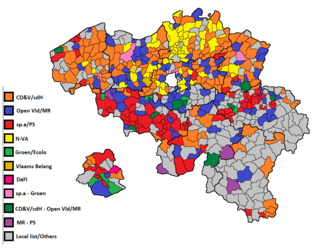| ||
 |
|---|
| This article is part of a series on the politics and government of Belgium |
| Constitution |
|
| Foreign relations |
The Belgian provincial, municipal and district elections of 2006 took place on Sunday 8 October 2006. The electors have elected the municipal councillors of 589 cities and towns (308 in the Flemish Region, 262 in the Walloon Region and 19 in the Brussels-Capital Region) as well as the ten provincial councils. The voters in the town of Antwerp have also been able to vote for the city's district councils. In seven Flemish municipalities with a special language statute (Drogenbos, Kraainem, Linkebeek, Sint-Genesius-Rode, Wemmel, Wezembeek-Oppem and Voeren) and in the Walloon municipality of Comines-Warneton the aldermen and the members of the OCMW/CPAS council have also been directly elected.

The Flemish Region is one of the three regions of the Kingdom of Belgium—alongside the Walloon Region and the Brussels-Capital Region. Colloquially, it is usually simply referred to as Flanders. It occupies the northern part of Belgium and covers an area of 13,522 km2. It is one of the most densely populated regions of Europe with around 480 inhabitants per square kilometer.

Wallonia is a region of Belgium. As the southern portion of the country, Wallonia is primarily French-speaking, and accounts for 55% of Belgium's territory and a third of its population. The Walloon Region was not merged with the French Community of Belgium, which is the political entity responsible for matters related mainly to culture and education, because the French Community of Belgium encompasses both Wallonia and the majority French-Speaking Brussels-Capital Region. The German-speaking minority in eastern Wallonia results from WWI and the subsequent annexation of three cantons that were initially part of the former German empire. This community represents less than 1% of the Belgian population. It forms the German-speaking Community of Belgium, which has its own government and parliament for culture-related issues.

Antwerp is a city in Belgium, and is the capital of Antwerp province in Flanders. With a population of 520,504, it is the most populous city proper in Belgium, and with 1,200,000 the second largest metropolitan region after Brussels.
Contents
- Organisation
- Municipal elections
- Provincial elections
- Polls
- Flemish region
- Walloon Region
- Results
- Flanders
- Wallonia
- Brussels
- External links
- References
It was the first municipal and provincial elections since the transfer of the competence with regards to the municipalities and provinces to the regions, also residents without E.U. citizenship could vote for the first time if they had registered to vote. The previous municipal and provincial elections took place on Sunday 8 October 2000.
City and provincial councillors are elected to a six-year term. Newly elected councillors will take office in January 2007, with a term ending in 2013.
Points of notice are the result of the governing federal government coalition (liberal/social-democrat) - for whom a bad result could spell defeat in the federal general elections to be held no later than June 2007 - and the result of the Vlaams Belang party in Antwerp and the other Flemish towns.

The Verhofstadt II Government was the federal government of Belgium from 12 July 2003 to 21 December 2007.

Vlaams Belang is a right-wing populist and Flemish nationalist political party in the Flemish Region and Brussels of Belgium.














